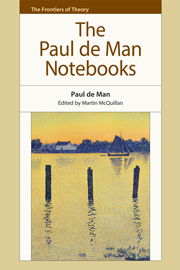Book contents
- Frontmatter
- Contents
- Series Editor's Preface
- Acknowledgements
- Dedication
- Introduction: ‘The Unimaginable Touch of Time’: The Public and Private in the Notebooks of Paul de Man
- PART I Texts
- PART II Translations
- PART III Teaching
- PART IV Research
- 27 The Unimaginable Touch of Time: Proposed Table of Contents
- 28 Modernism in Literature: Background and Essay Selection
- 29 Modernism in Literature: Revised Table of Contents
- 30 The Portable Rousseau: Table of Contents
- 31 The Portable Rousseau: Principle of Selection
- 32 Outline for a Monograph on Nietzsche
- 33 From Nietzsche to Rousseau
- 34 Allegories of Reading: Figural Language in Rousseau, Nietzsche, Rilke, and Proust
- 35 Aesthetics, Rhetoric, Ideology
- 36 11/3/82
- Appendix. The Notebooks of Paul de Man 1963–83
- Bibliography
- Index of Names
33 - From Nietzsche to Rousseau
from PART IV - Research
Published online by Cambridge University Press: 05 December 2014
- Frontmatter
- Contents
- Series Editor's Preface
- Acknowledgements
- Dedication
- Introduction: ‘The Unimaginable Touch of Time’: The Public and Private in the Notebooks of Paul de Man
- PART I Texts
- PART II Translations
- PART III Teaching
- PART IV Research
- 27 The Unimaginable Touch of Time: Proposed Table of Contents
- 28 Modernism in Literature: Background and Essay Selection
- 29 Modernism in Literature: Revised Table of Contents
- 30 The Portable Rousseau: Table of Contents
- 31 The Portable Rousseau: Principle of Selection
- 32 Outline for a Monograph on Nietzsche
- 33 From Nietzsche to Rousseau
- 34 Allegories of Reading: Figural Language in Rousseau, Nietzsche, Rilke, and Proust
- 35 Aesthetics, Rhetoric, Ideology
- 36 11/3/82
- Appendix. The Notebooks of Paul de Man 1963–83
- Bibliography
- Index of Names
Summary
Statement
The project is the outcome of a fifteen-year-long concern with the history and the poetics of romantic and post-romantic literature in France, Germany and England. It began as a study of the poetry of Mallarmé, Yeats, and George written as a doctoral dissertation at Harvard under the title “The Post-Romantic Predicament.” In the course of rewriting this thesis for publication, I increasingly felt the need for a wider historical framework reaching back to the later part of the eighteenth century. At the same time, the experience of teaching alternatively in the US and in Europe has led me to reflect on certain comparative problems in the methodology of literary analysis. The results of these reflections appear in the book entitled The Crisis of Contemporary Criticism, scheduled to appear in 1970 at the Oxford University Press. This book, however, is only the by-product of the larger project described in this application, in which my experiences with continental and American methods of literary interpretation should find their practical application.
My continued interest in the problem of romanticism has focused on a group of texts by Rousseau, Hölderlin, Wordsworth, Keats, Kleist, Friedrich Schlegel, etc., as well as on works of a later period by Baudelaire, Flaubert, Mallarmé, Yeats, Rilke, George, Proust and others. From these texts, I have moved on to general considerations on distinctive aspects of romantic diction and rhetoric.
- Type
- Chapter
- Information
- The Paul de Man Notebooks , pp. 300 - 302Publisher: Edinburgh University PressPrint publication year: 2014



